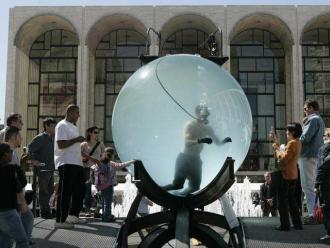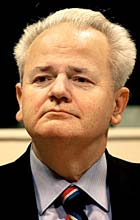
About four years ago I ran into David Blaine in a crowded New York City subway station. He was performing his usual card tricks for the local street gangs. I had admired his magic for years and really thought that, as the locals say, he “
Got Skillz”. I watched for twenty minutes and then went on my way but it was the highlight of my day. There is no doubt his talent is far superior to others in his field.
Of course, if you were one of the lucky few million that caught his special the other night on ABC then you probably already know what I mean. As of late though, he’s taken to doing all sorts of ‘pseudo’ tricks, like living in a bubble full of water for one week in the middle of Lincoln Center.
“Why the hell would anyone want to live under water for one full week?” I’ll venture to say it’s good for publicity. But why am I even discussing the subject on a medical blog?
Here we are and it’s Sunday night and there is a man on television about to suffer through a live
apnea test in front of the whole world! And in my twisted
doctor mind part of me wished I could test his blood gases, I could peak at his pH. Maybe even figure out how he would do it. So I kinda did and I thought I would share some of what I’ve learned with you. But before I launch into that, you must be wondering what the apnea test is.
Taken literally the word “apnea” means “cessation of breathing” and the main purpose of this test is to determine if a patient is clinically brain dead. It’s used mainly when it is believed that the patient underwent such a catastrophic event that he/she no longer has any brain function, including the drive to breath. We believe that brain death is the equivalent of
death and we use the apnea test, as one test among others, to confirm clinical brain death.
How is the test performed? The patient is disconnected from the ventilator for ten minutes and monitored for spontaneous breathing. At the same time, we continually monitor their blood gases (the concentration of oxygen and carbon dioxide in their blood) throughout the test. When a human being ceases to breathe the concentration of carbon dioxide in the blood rises and the concentration of oxygen falls. Patients fail the test if the concentration of carbon dioxide in the blood rise to twenty above baseline levels and no spontaneous breath is recorded. But how does all this relate to breath-holding in a live human being. Well, it technically doesn’t, but the same process will go on there as well. Slowly, the amount of oxygen in Blaine’s body will dwindle as the carbon dioxide level will rise. Slowly but surely, the feeling will become unbearable and his brain will begin to signal frantically for oxygen. But at what point will all this become so unbearable that it will override his will not to inhale?
There aren’t many studies that have investigated the human ability to breath-hold. But those that have been conducted have shown that breath-hold duration depends on numerous variables. One fact of solace was that, regardless of the circumstances, human beings seem incapable of holding their breath to unconsciousness.
For one, breath hold duration is increased by
increasing lung inflation. One would expect that lung volume would stay constant during breath holding but this doesn't appear to be the case, mainly due to complicated pressure gradients that are beyond the scope of this discussion. However, one theory was that the breakpoint (point at which breath holding is no longer possible) may be dependent on some minimum chest size when this deflation would cause sufficient feedback to the brain respiratory center to initiate a breath. This however does not appear to be the case.
Interestingly, breath holding duration is almost
doubled by either starting with a lower than normal blood carbon dioxide level, which can be achieved by hyperventilation or holding with gas mixtures that have an excessive concentration of oxygen. For those who witnessed the event, Blaine was coached to hyperventilate (purge) prior to going under, presumably to decrease the carbon dioxide levels in his blood. Obviously, he did his homework.
Increased metabolic rates decrease breath hold duration. Likewise, decreased metabolic rates increase it. I would suppose that it wouldn't be unreasonable to think that the tank that Blaine used was probably cooled to temperatures that would decrease metabolic demand during the final event. Surely, Blaine would have taken advantage of this phenomenon.
Do arterial chemo receptors dictate the breath breakpoint, maybe yes and maybe no. the fact that there is no consistent carbon dioxide blood level at breakpoint in study subjects suggest that this is not the case, however, one experiment in patients whose arterial chemo receptors were not functional showed that these subjects could breath-hold almost double the time of healthy subjects. I can't put it past Blaine to somehow alter the response of his chemo receptors prior to the event but I believe it is unlikely.
The bottom line:
Was I the only one who thought Evil Knievil was going to bitch slap Blaine during the interview? I bet not.
During the interview Blaine demonstrated that he could hold his breath for approximately five minutes (an amazing amount of time), or 305 seconds. if Blaine was to cool the water tank to decrease his metabolic rate and even increase his breath holding duration by 25% (no exact prolongation constant is available) than he would be able to hold his breath under these conditions for approximately 6 and one half minutes. By hyperventilating prior to starting the hold he would increase his time easily by an additional 25% which would conclude a total time of eight minutes (assuming he did not do this prior to his breath hold with kenivel).
Blaine was able to hold seven minutes and ten seconds. Pretty damn good but not much improved from his prior attempt with kenivel once all other factors are taken into account.
Overall, I think it’s safe to assume the event was more of a publicity stunt for Blaine’s magic than for actually breaking the world record. The special was good. Some of the tricks were unbelievable. Now all that’s left is to see what he’s going to do next.
Heck, he’s had a week under water to think about it!
A great article on the factors involved in breath holding can be found here.
 Tonight, Bob Woodruff appeared on The Daily Show. Funny I should start my first post back with this one particular fact. But it is one that stands out tonight. I will get back to it soon.
Tonight, Bob Woodruff appeared on The Daily Show. Funny I should start my first post back with this one particular fact. But it is one that stands out tonight. I will get back to it soon.

 About four years ago I ran into David Blaine in a crowded New York City subway station. He was performing his usual card tricks for the local street gangs. I had admired his magic for years and really thought that, as the locals say, he “Got Skillz”. I watched for twenty minutes and then went on my way but it was the highlight of my day. There is no doubt his talent is far superior to others in his field.
About four years ago I ran into David Blaine in a crowded New York City subway station. He was performing his usual card tricks for the local street gangs. I had admired his magic for years and really thought that, as the locals say, he “Got Skillz”. I watched for twenty minutes and then went on my way but it was the highlight of my day. There is no doubt his talent is far superior to others in his field.
